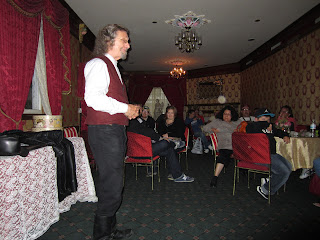But we managed to dodge the waits. The most popular, E-ticket attractions were our first goal, and minus the space themed roller-coaster, and the famous Pirates of The Caribbean, we made our goals. We were eating lunch when we realized the theatre we were eating in had several more groups of people; leaving, open sidewalks, stores, and attraction lines were filled to capacity. Where did they all come from?
The rest of the day was spent hunting for a ride, or some place to sit, but every location we spotted was taken and filled. The churro booth--with the infamous eight dollar stick of sugar--had a line that could only compare to a class registration line back at our campus--so sad, too bad, but come back later. My phone was dying, so these wait times were becoming more of a hindrance than a relaxing breath.
My sister, a mother of one boy, called my brother to let us know she was on her way. The day was over around four thirty, so we hunkered to wait, but there was a commotion towards the front of Main Street U.S.A.. Moving to the front of the park, it was obvious, now: Disneyland was hosting their Candlelight Processional, a seasonal tribute to the holiday season with a reading from the Bible, depicting the first Christmas with a symphony orchestra and a large, boisterous choir. I knew the processions were hosted by a celebrity, so it wasn't a surprise such an event was popular, asides from the music. We crawled under the standing-room rope and waited for an hour to watch the hour long mass and performance--it was worth it.
Choir performers marched down a darkened main street, candles in hand, filling the streets with amazing songs of Christmas, such as Noel and Silent Night. When they arrived to the train station, the greased-up, make-shift stage, the orchestra sounded fanfares over the parks and played along with the choir's lyrics. Once placed on the staircase of the station, our celebrity narrator, John Stamos, was announced, and he begun to read, stopping several lines to allow a song in from the orchestra and choir. I found it beautiful; however, everyone around me, mother included, was in tears.
The performance took an hour, and each song built to the final performance of the Hallelujah chorus, rejoicing in the birth. Once finished, John Stamos began to discuss Disneyland, and its impact on him through life, acting, and raising a family. It took an emotional turn, when Stamos stated we were in a tough time at our nation's history, and we need to keep in mind the children in Connecticut, along with those few teachers, who lost their lives, and unlike us, will be unable to enjoy the magic of Disneyland, Christmas, and opening up presents with their families, ever again--I lost it. For Disney, the event was something I would have never expected; we see the animation company as one, while taking note of the tough times in life and growth, stands to an extent distant from touchy subjects, but this felt real. Observing the beauty of Christmas, stories of religion, and taking into mind the worst moments in our nation, giving silence to them in thought, Disney has shown me a new side, that while it might have always been there, I have never fully seen asides the eight minute introduction to the film, "Up." It wasn't just the audience in tears as John Stamos, too, stopped for a moment to calm himself.
Disney and their theme-parks are not only moving to our nation's change of culture and problems, but adapting to it. Disneyland has always been a special place in my life for how they treat their guests and the holiday season. While expensive, the price of admission, to me, is well worth it, for they continue to hold not only great attractions and shows, but memorable, emotional events that can not compare to any other theme-park in the world. Even if it was crowded, me and my family had a great time, and enjoyed an event that is new to us, but we hope to return to in the future. Also, we never got to meet John Stamos; there were enough women in the audience, screaming, to let us know he, too, would be missed.
(my mother, myself, and my twin brother).
From my family to yours, we wish you a happy, safe holiday, and a glorious new year.










